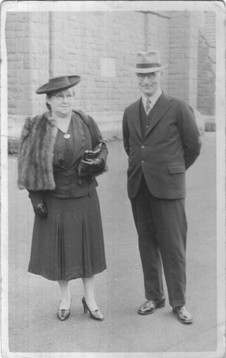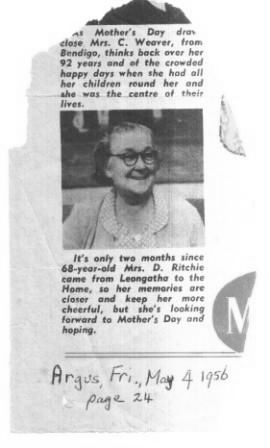"I have another duty, equally sacred, a duty to myself " Dora: A Doll's House, Henrik Ibsen,1879
1. Welcome to Our Foremothers - "Here is one story ..."
2. First Owners
On this page:
KOORIE STORY: Pre 1863.
SOCIAL STORY: Melbourne 1863.
3. Sara and Sheyda Rimmer
On this page:
OUR STORY: Sarah Curry
KOORIE STORY: 1864 Corandarrk - Diaspora, the Start;
SOCIAL STORY: The Immigrants Home, 'The Fortunes of Mary Fortune'.
4. Smythesdale Goldfields
On this page:
SOCIAL STORY: Women on the goldfields - 'What a Woman on Ballaraat Can Do'; The Sandhurst Impersonator; the Sinking Cathedral.
5. The Egalitarian Idea
On this page:
KOORIE STORY: Resisting Oppression - Louisa Briggs;
SOCIAL STORY:
Enlightenment Thinking; Education; the Education Act. 1872.0's-80's - Free, Compulsary and Secular Education; Not Equal if you are Aboriginal
6. A Fair Go
On this Page:
OUR STORY: Sarah's 'Fair Go'.
KOORIE STORY: Struggles; Coranderrk Petition.
SOCIAL STORY: A Fair Go, the 1882 Tailoresses Strike, the Woman's Suffrage Society; the 'Mother of Womanhood Suffrage' - Louisa Lawson; Orphans & Institutions.
7. Going Backwards
On this Page:
KOORIE STORY:
the Half Caste Amendment Act oy Murphy; Coranderrk.
SOCIAL STORY - Reaction; 1890’s Economic Depression; Women's Paid Work.
8. Running Free
On this page:
OUR STORY: "NO DAUGHTER OF MINE ..."; Hard Yakka.
KOORIE STORY: Indigenous Exclusion.
9. Women Were Not Quiet
On this Page:
Social Story: The Hospital Run By Women For Women;The Victorian Lady Teachers' Association; The 1891 'Monster' Suffrage Petition - Vida Goldstein.
10. Building Peace at Home WW1
On this page:
OUR STORY
KOORIE STORY - Coranderrk Closure
SOCIAL STORY - Conscription; White Feathers; The Zurich Women's Peace Conference; Free Trade
11. A World Not Fit For Heroes
On this page:
OUR STORY
KOORIE STORY: Australian Aborigines League; Cummeraaginja; 26th January, Day of Mourning - Beryl Booth, Margaret Tucker.
SOCIAL STORY: Economic Depression; Making Do - Yvonne Smith.
12. Another War - WW2
On this page:
OUR STORY Our Family
KOORIE STORY: There's Work When We Need You - Nora Murray.
SOCIAL STORY: Pulling Together - Edith Morgan; After the War - Things Weren't All Rosy - Joyce Stevens.
13. Howard's Way - the 1950's
On this page:
OUR STORY
KOORIE STORY: Maralinga - Joan Wingfield, Gwen Rathman; More Protest - Warburton Ranges; Lake Tyers; More Protest;
SOCIAL STORY: Camp Pell; Conformity & Hidden Poverty; The Communist Party Dissolution Bill..
14. A Life Well Spent
On this page:
OUR STORY - Sad times
SOCIAL STORY: Hypocrisy; Hope; the end
Our Foremothers is published by
Women's Web Inc.
Telephone: 03 9486 1808
www.womensweb.com.au
womensweb@iprimus.com.au
© Geraldine Robertson except for study, social justice and feminist sharing.
Our Foremothers |
|---|
14. A LIFE WELL SPENT
On this page:
OUR STORY - Sad times
SOCIAL STORY: Hypocrisy; Hope - the Union of Australian Women.
OUR STORY - Sad times
Papa became ill and died a year or so later.
Nana had a stroke a year after that and our family brought her to Melbourne where she could be looked after better.
After excellent treatment by the nuns at the Sacred Heart hospital in Moreland combined with her courage and hard work, she learned to walk again and went to Royal Park nursing home.
Unfortunately, most of the patients at Royal Park suffered from dementia, and the staff often treated everyone as if they were stupid, so Nana was quite lonely. My mother bought a house in Camberwell. She, Nana and I moved in.
I moved from a school in a slum area where children were deprived, to a good area and good school – Camberwell State School (yes, you went there). But I wasn't comfortable there. I was poorer than most of the other children. The other children who were poor were also rejected.
For example, we were warned, again and again, against what they called bad boys – the boys who tried to run away from the Salvation Army Boy’s Home.
Those frightened, unhappy boys were called bad and beaten.
Also, a girl who lived with foster parents borrowed my watch overnight. She didn’t come to school the next day, or the next, so I went to her house to get the watch back, but her foster parents wouldn’t let me see her.
They had kept her locked in the attic with nothing but bread and water as punishment for stealing. They said she was a bad girl – even after realizing their mistake. They said I shouldn’t mix with bad girls like that!
I had never seen abuse of children like this. I told Nana, and that was when she told me about her experience when she was training as a nurse. She also contacted the school and the girl was moved from that foster home, but said she couldn’t do anything about the boys.
There wasn’t much comfort for many, though.
Women who had children and no man to support them were treated as criminals or ‘bad’, and punished.
When they gave birth they would be ordered to sign a form to give the infant up if they cared for him or her. If they refused a social worker would be called in and declare the infant at risk, so it would be taken anyway. It was not unusual to hear of an abandoned newborn baby found on, for example, church steps.
Women who found themselves with an unwanted pregnancy and were desperate enough to have a ‘backyard’ abortion could end up dead – dumped in the Bay or put in another person’s coffin.
People with disabilities were often only given ‘cold charity’ - dumped in institutions or neglected and, sometimes, exploited.
There was police corruption. There was fear – of the Bomb, of Communism, of Asia.
The atomic tests made at least a thousand Aboriginal people homeless.
National Service (conscription) was brought in and young men were sent away to fight in Korea and Malaya.
Australia was very conservative and it was a rather nasty period. To go into the street and present an alternative view was an act of considerable courage.
Edith Morgan, Left Wing Ladies, the Union of Australian Women in Victoria, 1950-1998, Suzanne Fabian & Morag Loh, Hyland House 2000
It was like living in a good world but knowing there was a nasty underside just out of sight and never knowing just when it would bite.
Even Labour Day processions were stopped. They were replaced by MOOMBA. We were told this meant 'let's get together and have fun' in an Aboriginal language. Struggle for social justice was replaced by fun!
Hope
It was also a time of hope, being about your age in the 1950’s.
Things we thought good were happening such as public housing, the Snowy Mountain Scheme, antibiotics and cortisone (the miracle drugs), the triple antigen and Salk vaccines (the vaccines took away a lot of the fear that people with children experienced).
We also did have fun. Television came in. We would stand in front of shop windows and watch the flickering screens of the sets in the shop, or visit rich relatives and, after turning out the lights, watch American programs such as 'I Love Lucy'.
Ballet was popular then. We saved for cheap tickets in the 'God's' or for standing room, to see Borovansky's ballets. There was the Olympic Games to watch on the television.
There were: Peace marches; Ban the Bomb rallies; Equal Pay demonstrations and The Teaching Service (Married Women) Act (Victoria) granted permanency (but not superannuation rights) to women.
Women were active, although in a quiet way.
YVONNE SMITH - UNION OF AUSTRALIAN WOMEN
I again became active with the Union of Australian Women (UAW) in Sunshine. We had many local campaigns around local and international issues:
- support for land rights with Aboriginal women speakers;
- health issues with large public meetings with experts to explain e.g. Salk vaccination, Pap smear tests for women;
- deputations to the local council on the cost of living; peace art competitions for local schools;
- speakers on equal pay;
- organising equal pay speakers at local factories; letter writing, and selling our UAW magazine 'Our Women' on a regular basis at the post office on child endowment day, where we also had goods and cake stalls to raise money. www.womensweb.com.au
Money was short and we found out Nana was eligible for the Old Age Pension. However she wouldn’t apply.
She said she knew pride was a sin and she hoped this wasn’t the only reason why, but she asked us not to ask her to accept charity.
The pension was called an entitlement then, but she saw it as charity.
That was not the only legacy from that time. I used to go home from school at lunchtime to help Nana get her lunch. She only had a piece of bread and cheese and an apple, but she used to insist I brought out nearly everything from the refrigerator - cake from the cake tin and biscuits from the biscuit tin, and well as anything else around that could possibly be called food.
The reason Nana wanted me to do this?
She was afraid someone might come and think the bread, cheese and apple was all she could afford. She was afraid here too that people might think she needed charity. She was afraid of being, or seen to be, poor.
There was one other thing.
Nana also said many desperate men had kept their families going by selling Rawleigh’s toiletries and cleaners, so if a salesman from Rawleigh’s came to the door she asked me to buy all we could use.
It seemed to me that Nana wanted to single handedly keep Rawleigh’s prosperous. I dreamt of using the creams and lotions the film stars used – but the cupboard was always full of Rawleigh’s.
Towards the end of her life Nana said she was content.
Your father, Stephen, was a great joy to her. She couldn’t hold him because of the damage to her arm caused by the stroke, but I used to put him on a bunny rug on the floor and she would watch over him. It was Nana who won his first real smile (although that can be debated) and it was Nana who saw him teach himself to turn over.
She still missed her husband to a painful degree. She kept a book called Come Ye Apart and bookmark with a prayer on her bedside table. She said they were a comfort to her.
I remember she often quoted a proverb when I was having an argument with someone, or was angry with someone. She would smile and say:
“But if you could walk a mile in his (or her) shoes? “
I looked this up on the internet, too. It says:
“Don’t criticize a man until you have walked a mile in his shoes. That way, if he doesn’t like it, he is a mile away and barefoot.”
Iranian Proverb
The End

